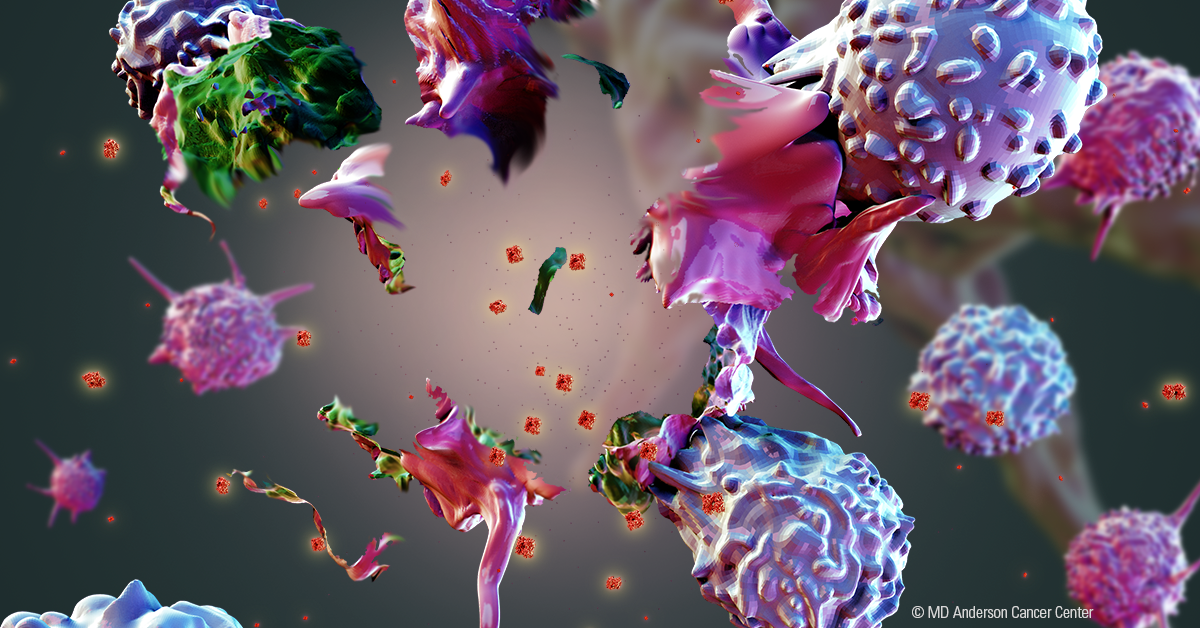- Diseases
- Acoustic Neuroma (16)
- Adrenal Gland Tumor (24)
- Anal Cancer (70)
- Anemia (2)
- Appendix Cancer (18)
- Bile Duct Cancer (26)
- Bladder Cancer (74)
- Brain Metastases (28)
- Brain Tumor (234)
- Breast Cancer (726)
- Breast Implant-Associated Anaplastic Large Cell Lymphoma (2)
- Cancer of Unknown Primary (4)
- Carcinoid Tumor (8)
- Cervical Cancer (164)
- Colon Cancer (168)
- Colorectal Cancer (118)
- Endocrine Tumor (4)
- Esophageal Cancer (44)
- Eye Cancer (36)
- Fallopian Tube Cancer (8)
- Germ Cell Tumor (4)
- Gestational Trophoblastic Disease (2)
- Head and Neck Cancer (14)
- Kidney Cancer (130)
- Leukemia (342)
- Liver Cancer (50)
- Lung Cancer (286)
- Lymphoma (278)
- Mesothelioma (14)
- Metastasis (30)
- Multiple Myeloma (100)
- Myelodysplastic Syndrome (60)
- Myeloproliferative Neoplasm (6)
- Neuroendocrine Tumors (16)
- Oral Cancer (102)
- Ovarian Cancer (178)
- Pancreatic Cancer (160)
- Parathyroid Disease (2)
- Penile Cancer (14)
- Pituitary Tumor (6)
- Prostate Cancer (150)
- Rectal Cancer (58)
- Renal Medullary Carcinoma (6)
- Salivary Gland Cancer (14)
- Sarcoma (238)
- Skin Cancer (300)
- Skull Base Tumors (56)
- Spinal Tumor (12)
- Stomach Cancer (66)
- Testicular Cancer (28)
- Throat Cancer (92)
- Thymoma (6)
- Thyroid Cancer (100)
- Tonsil Cancer (30)
- Uterine Cancer (86)
- Vaginal Cancer (18)
- Vulvar Cancer (22)
- Cancer Topic
- Adolescent and Young Adult Cancer Issues (22)
- Advance Care Planning (12)
- Biostatistics (2)
- Blood Donation (18)
- Bone Health (8)
- COVID-19 (360)
- Cancer Recurrence (120)
- Childhood Cancer Issues (120)
- Clinical Trials (628)
- Complementary Integrative Medicine (22)
- Cytogenetics (2)
- DNA Methylation (4)
- Diagnosis (238)
- Epigenetics (6)
- Fertility (62)
- Follow-up Guidelines (2)
- Health Disparities (14)
- Hereditary Cancer Syndromes (128)
- Immunology (18)
- Li-Fraumeni Syndrome (8)
- Mental Health (122)
- Molecular Diagnostics (8)
- Pain Management (62)
- Palliative Care (8)
- Pathology (10)
- Physical Therapy (18)
- Pregnancy (18)
- Prevention (936)
- Research (390)
- Second Opinion (78)
- Sexuality (16)
- Side Effects (616)
- Sleep Disorders (10)
- Stem Cell Transplantation Cellular Therapy (216)
- Support (408)
- Survivorship (328)
- Symptoms (182)
- Treatment (1788)
4 appendix cancer questions, answered
5 minute read | Published August 25, 2021
Medically Reviewed | Last reviewed by an MD Anderson Cancer Center medical professional on August 25, 2021
When John Paul Shen, M.D., tells people he studies appendix cancer, many are surprised to learn that you can get appendix cancer in the first place.
Perhaps this response isn’t totally unwarranted. Appendix cancer is rare. There are just over 3,000 cases diagnosed in the United States each year. On top of that, the appendix’s location near the large and small intestine meant appendix cancer was considered — and treated as — colorectal cancer until several major papers were published after 2010.
And although Shen, an assistant professor in Gastrointestinal Medical Oncology, notes that the molecular distinction between appendix and colorectal cancer is now clear, the ways this change impacts appendix cancer treatment have yet to be fully explored.
The field of appendix cancer research is full of possibilities. At MD Anderson alone, researchers are conducting clinical trials to explore treatments for different types of appendix cancer, establishing national treatment guidelines for appendix cancer care, and working to develop the first-ever drug specifically for appendix cancer.
Here, Shen answers commonly asked appendix cancer questions and shares insight into the future of appendix cancer treatment.
How is appendix cancer diagnosed?
Diagnosing appendix cancer can be a challenge. Unlike colorectal cancer’s colonoscopy or breast cancer’s mammogram, there aren’t screening tests that can be used to detect appendix cancer in its early stages. There aren’t obvious risk factors, and because appendix cancer symptoms are so general, like abdominal pain, they aren’t very helpful in identifying appendix cancer, either.
Shen says appendix cancer is usually diagnosed in one of two situations. The first is when a patient has surgery to remove the appendix for appendicitis and the doctor finds cancer while examining the organ under a microscope. The second is when cancer spreads from the appendix into the abdomen, causing symptoms like abdominal pain, bloating, fluid in the abdomen, bowel obstructions, or nonspecific cancer symptoms like unexplained weight loss and fatigue. From there, a doctor might take a biopsy of the appendix to determine if these symptoms may be appendix cancer.
Another challenge of detecting appendix cancer? The tumor’s appearance. Instead of forming a ball of tumor cells, appendix cancer forms in thin layers that can be hard to see using imaging options like CT scans. “You might have a thin sheet of cells that is only one or two cells thick but it’s covering all the intestines,” says Shen. “Think about it like if you painted the walls of a room with cancer; that’s kind of what appendix cancer does.”
What are the different types of appendix cancer?
The type of appendix cancer is determined by the cells the cancer begins in. The two most common appendix cancer types are:
- neuroendocrine tumors, which begin in the appendix’s neuroendocrine cells, and
- appendiceal adenocarcinomas, which begin in the cells lining the appendix.
A pathologist will examine appendix cancer cells under a microscope to determine whether the cancer is high-grade or low-grade. The grade shows how aggressive the cancer is. Based on the grade, your care team will develop a treatment plan.
“All cancer cells look abnormal under a microscope; that's what makes them cancer,” explains Shen. “A low-grade appendiceal tumor is closer on the spectrum to pre-cancer; under the microscope, it still looks like normal appendix tissue. High-grade is aggressive and doesn't really retain any of the characteristics of the normal tissue.”
How is appendix cancer treated?
The topic of appendix cancer treatment leads us to another one of Shen’s most commonly asked questions: why not just remove the entire appendix? After all, it is possible for humans to live without an appendix, and isn’t the appendix removed in surgery for appendicitis, anyway?
Unfortunately, it isn’t that straightforward. “Unless it is caught early, by the time you know that you have appendix cancer, you've got tumor all over your abdomen,” says Shen. “The tumor that's in the appendix is no longer the problem.”
Instead, oncologists consider the cancer grade and factors like the tumor biomarkers and a patient’s health to customize treatment.
For example, early stage cancers may be treated with a combination of surgery and hyperthermic intraperitoneal chemotherapy (HIPEC). HIPEC is a form of heated chemotherapy that is applied directly to a tumor site during surgery. According to Shen, the combination of heat and applying a high-concentration of chemotherapy to a precise location helps kill cancer cells.
Debulking, or removing as much of the tumor as possible, is also an option for treating low-grade tumors because of their slower growth.
For high-grade, or more aggressive tumors, however, surgery is only offered when the tumor is able to be fully removed. This is often not the case when cancer spreads rapidly.
“High-grade tumors grow too fast. If you can't take all the tumor out, the tumor that's left is going to keep growing,” Shen explains. He notes that after surgery a patient needs time to recover preventing them from receiving other treatments like chemotherapy that could help their quality of life and relieve symptoms.
What is next for appendix cancer research?
Shen hopes there will be an easier way to screen for appendix cancer in the coming years. He is currently conducting a study of blood samples from appendix cancer patients to see if there are any biomarkers that point to cancer.
“If we know that a patient has appendix cancer and you still can't find evidence of that in the blood, we're never going to be able to use the blood to screen,” he says.
Shen’s lab is also creating appendix cancer models that can be used to study tumor samples and test possible treatments.
“One of the reasons that it's hard to make a drug for appendix cancers is that we don't have good ways to test it,” he explains. “Pretty much any time someone goes to surgery, we're capturing their tissue so we can study it and see what genes are mutated. We're using that knowledge to help design drugs.”
To that end, researchers are creating a new treatment option targeting the GNAS gene found in many appendix cancer tumors. Researchers are also considering ways to repurpose Food and Drug Administration-approved drugs used for other diseases to treat appendix cancer.
“We're starting from scratch because, as far as I know, no one has really put effort into making drugs for appendix cancer,” Shen says. “I'm really excited that we have the resources to change the way that appendix cancer is treated.”
Request an appointment at MD Anderson online or by calling 1-877-632-6789.
Related Cancerwise Stories

I'm really excited that we have the resources to change the way that appendix cancer is treated.
John Paul Shen, M.D.
Physician & Researcher





